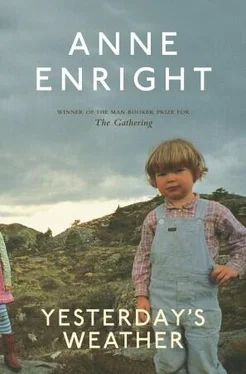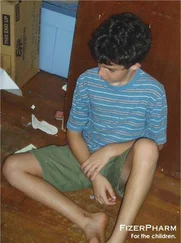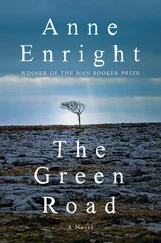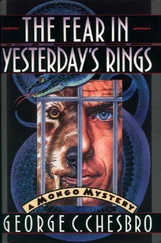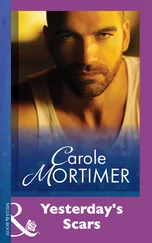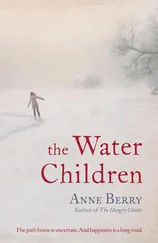‘So, why didn’t you?’ she said.
That wasn’t the point, he said. The point was him going back out into the garden and looking at these people having their good time. The sun going down. Alfie checking him as he came out the garage door. The point was that he realised that there was nowhere else to go.
He didn’t know how to explain it. This garden, this pot-luck bloody barbecue, was all there was. And that’s why people stayed in Dewey — because we all lived in Dewey. There was nowhere else to go.
‘So welcome home,’ she said.
She made scrambled eggs for him and her hands were trembling. She did not know how to keep him in the flat, or what to do, so she broke open a bottle of vodka and mixed it with the cranberry juice, which was all there was in the fridge, and he stuck his nose into his glass and laughed, ‘Nyack nyack nyack.’
He said he had a mad brother. He said mad people aren’t like they’re supposed to be. They’re just very dull. They talk about football all day, like anyone else — only more so. Then you see a smear of shit on the side of the bath. Uh-oh.
The other brother was a builder, he said.
He said he grew up in one of those houses that nobody likes; a big bungalow hacienda stuck out in the middle of a field. Though he missed the weather up there, it was better than the telly. And the bog out along the road to Strandhill, he loved it as a kid — playing Aztecs with pyramid stacks of turf, or staging the entire siege of Stalingrad all by himself, running through the trenches. Rat-a-tat-tat. Much slaughter.
And he pointed his finger and shot her.
There was a lot of stuff that wasn’t sex, just pawing and tormenting; while the sun appeared and left, in oblongs on the floor. He worked his way through the vodka while she trickled it into her tea and they watched children’s television and tried to have sex in the shower. She pulled him back from shouting out the window and late that night he said, or she thought he said, that he had fisted a woman once, and also that he used to meet a guy out on the Strandhill Road when he was a kid and that this guy would fuck him a bit and that he actually quite liked it. Actually .
She did not know if she slept or not.
In the morning he came out of the bathroom, beautiful and clean. He said that Elvis never went the whole way. Elvis was better than sex, he said. That was the problem. He knew there would be this shortfall, that in bed, he would never be as good as ‘Elvis Presley’.
‘What time is it?’ she said.
His chest was pale and freckled, all flat — he was arranged in slabs and blocks with a funny, bendy dick curled in the middle of it all. There was no sign or mark of the man he went to meet as a child and she wondered was that something she had dreamt too, because the road was still in her head and the boy walking along it, all night; and her face, in the dream, was pulled after him like toffee. His eyes were clear, amnesiac, and she thought that maybe he told everyone his bog story when he was really pissed; safe from remembering what he had said. Or maybe it was a lie. Maybe something terrible had happened to him — a different thing. Or nothing terrible had happened to him, and she would never find out what it was. Maybe he had never driven all the way to Dewey, Wisconsin.
‘Listen,’ she said. ‘I have to pick up my niece at half one, I promised to bring her into town.’
‘Your niece?’ he said.
‘Yes.’
‘How sweet.’
‘Fuck off,’ she said.
And still he sat in her yellow dressing gown, waiting for the paracetamol to work and flicking through an old copy of Vogue , like some parody of her Sunday-morning self.
She made a pot of tea.
He said that he met a transsexual in Reno with breasts you wouldn’t believe, but then you get down to the pants and … Surprise! And the problem is these breasts are still driving you crazy, you just want to lick them or have them; they just hit your override function, or something.
‘Kinky,’ she said.
And because she doesn’t believe him — or not in the way he would like her to believe him — he is at her again. And she can’t tell this person, this liar, two days in, that she doesn’t want him touching her any more. Though that is what this is turning into now — two people who don’t want to sleep with one another, snogging and clawing, and pushing each other against cupboards. But it doesn’t go any further, as she sort of knew it wouldn’t. He breaks away, and goes into the bedroom and starts to get dressed. Finally.
He comes back in and she is sitting at the table smoking a cigarette, and he is eight years old. Eight, or maybe nine. That’s the look on his little, slapped face.
‘So … hey!’ she says.
‘Hey, gorgeous.’
He pushes his boxers into his backpack, which means his little ass is bare under the jeans. And he leaves with big promises, and she shuts the door with big smiles and she showers and picks up her little niece; feeling a bit guilty, now and then, when she remembers the ruin between her legs.
The dream comes back to her all day. She thinks about it in the evening; sitting at the kitchen table and smoking while dusk turns to night. The thump and slap of the boy’s wellingtons on the road. The lilac-coloured shirt. The old man’s trousers that gape at the waist to show the lump of his hip and the elastic line of his underpants — an unwashed nylon stretch of mermaids, maybe, that his mother didn’t even notice when she bought them, or string pants that leave mesh marks on his skin, catching him like a fish.
The boy walks down the road, and he doesn’t know his own skin, or his tender little prick at the centre of this landscape and of these clothes. He walks down the road and into his own white breath — even his breath loves him, and the man who is watching from the ridge loves him, and so does the goddamned bog.
And she thinks that maybe she should have loved him too. Maybe she should have tried.
The boy sits down to take off a wellington, and the sight of his bare heel, a flush of red on white, puts him in mind of something.
Della thought about the stream again, which was black and broad, and the naked boys who played on its sloping banks, all very white. One of them reached towards the water with a stick, but the stick did not touch the water. You could see him leaning sideways off the steep bank. There was a scrubby tree leaning in from the other bank and its leaves were small and greyish against the black water. Della had no idea of where the river was, or who the boy was, or whether he was about to fall into the water. She did not know if this was something she had seen once, or whether she would see it some time in the future. It was a dream, or something off the telly. She thought it had something to do with the River Blackwater, but it was probably not even Irish. In Ireland, boys didn’t swim in the nip.
Della knew there was nothing important in the river — a clump of twigs and leaves, or a different-shaped stick. The boy was reaching out just for the pleasure of it; to see if he could.
She thought it might be in Russia, the river was so black and the trees were birch trees. Or maybe the boys’ bodies just reminded her of birch trees, that looked always so fresh and hopeful. But they looked sad too, she thought, like a picture of boys that was taken before a great war.
The man next door was going blind, but he didn’t seem to notice it. Della felt she should point it out to him, even though it was none of her business. They had lived side by side for over fifty years but they never got on much. Della had liked his wife once, but the wife was dead a long time, and he had never been chatty. Besides, there was a thing he had about children that stung Della when she was rearing her own. Her five and his two, now gone.
Читать дальше
